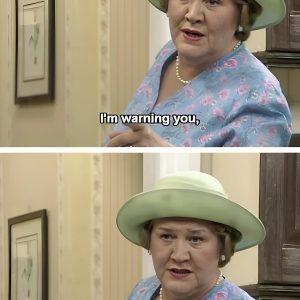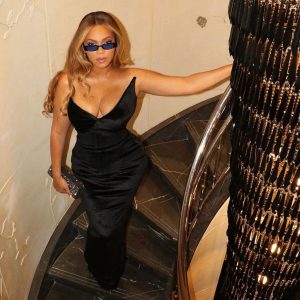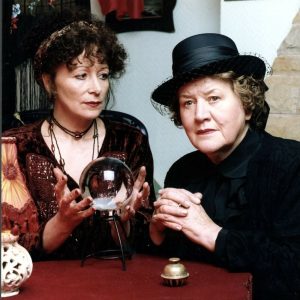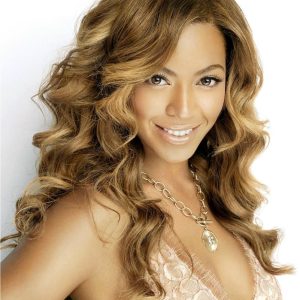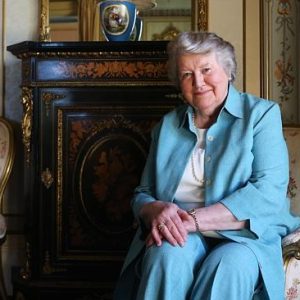Keeping Up Appearances: Behind the Teacups and Tension—Patricia Routledge and Clive Swift Reflect
In the pantheon of British sitcoms, few series have achieved the enduring cultural status of Keeping Up Appearances. Its secret? A deliciously absurd central character, Hyacinth Bucket (“It’s pronounced Bouquet!”), who turned social climbing into a comedic art form. The woman behind that genteel façade, Dame Patricia Routledge, brought unmatched sharpness and nuance to the character—a perfect blend of delusion and determination. Opposite her, as the perpetually beleaguered husband Richard, Clive Swift delivered deadpan brilliance and a resigned weariness that spoke volumes with a single sigh.
But rarely did fans get to see these two legendary actors—so iconic in their scripted bickering—sit side-by-side in candid conversation. That changed in a rare joint interview surrounding the show’s ambitious QEII special, an episode set aboard the iconic ocean liner Queen Elizabeth 2, where comedy sailed into new territory. The interview offered not just a glimpse into the making of one of the series’ most lavish episodes, but also a fascinating window into the working relationship between Routledge and Swift—one built on respect, rhythm, and perfectly timed repartee.
Setting Sail with Comedy Royalty
The QEII special marked one of the show’s most extravagant productions, taking Hyacinth’s relentless quest for social prestige to literal new heights—or rather, high seas. Boarding the cruise with all the smug satisfaction of a woman who believes herself destined for first-class society, Hyacinth becomes fixated on presenting herself as a fellow aristocrat among fellow “maritime elite.” What follows is an intricate ballet of faux-pas, misunderstandings, and a husband growing increasingly desperate to avoid total humiliation.
“It was Hyacinth at her most ambitious,” Routledge recalled during the interview, eyes twinkling with the memory. “She didn’t just want to keep up appearances. She wanted to elevate them—internationally.”
Swift, seated beside her, chuckled softly. “And Richard just wanted a quiet meal and no headlines.”
The on-screen dynamic between Hyacinth and Richard was, of course, one of the show’s greatest comedic weapons. But in real life, Routledge and Swift shared a notably different chemistry—marked not by exasperation or condescension, but by mutual admiration and generosity.
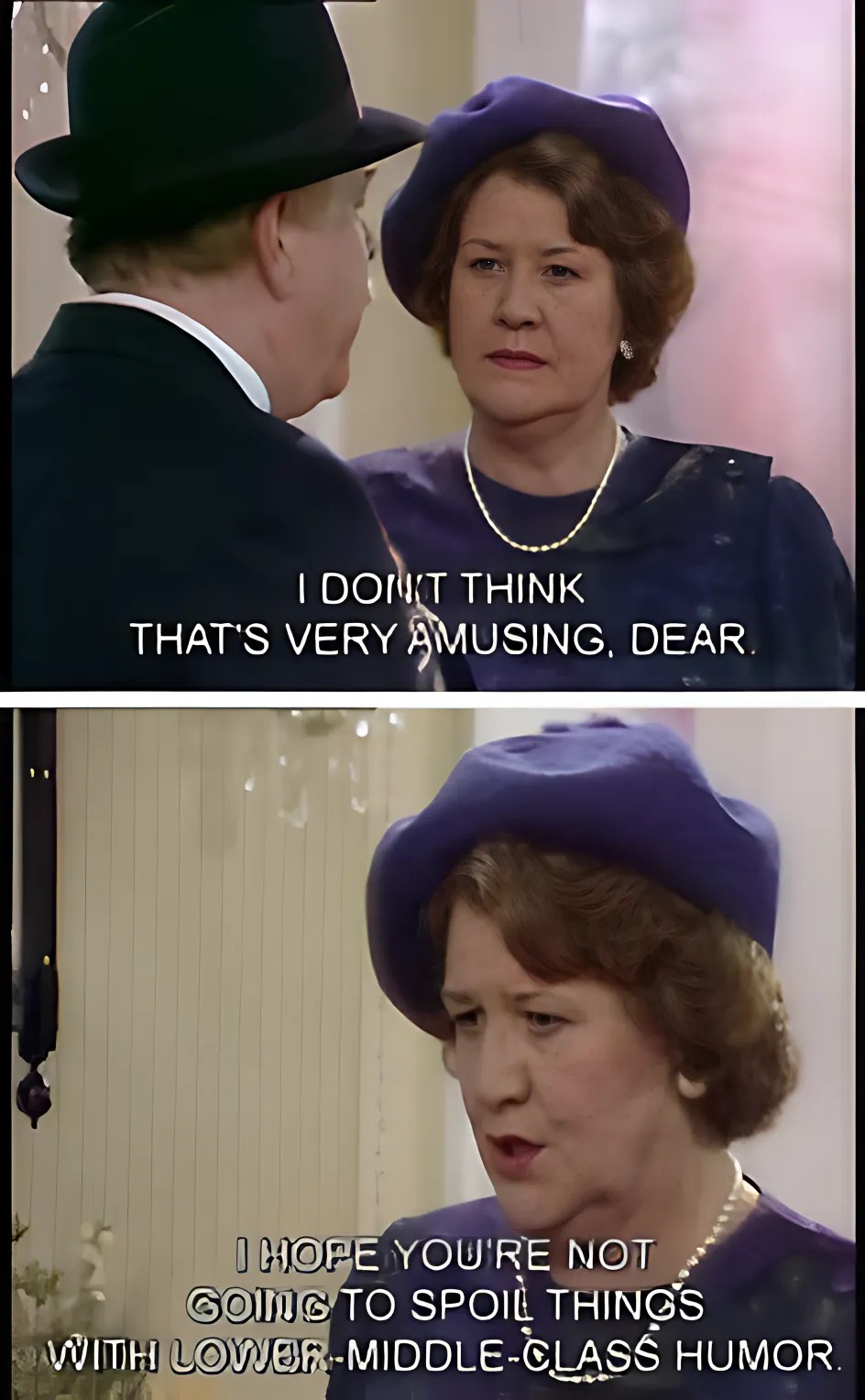
“This interview was a lovely surprise,” one viewer commented afterward. “Each actor gave the other space to speak, to reflect. No showboating, just grace.”
That observation rang especially true. In many ensemble interviews, it’s not uncommon for the show’s lead to dominate the dialogue. But here, Routledge and Swift navigated their reflections as smoothly as the QEII crossing itself, each building on the other’s thoughts with warmth and a shared sense of legacy.
Crafting the Comedy of Class
What made Keeping Up Appearances such a sharp-edged comedy was its surgical dissection of class anxiety. Hyacinth’s desperate efforts to distance herself from her working-class relatives—Daisy, Onslow, Rose, and the unseen but unforgettable Daddy—were both hilarious and painful. She didn’t just want to impress the vicar; she wanted to ascend the British social ladder by sheer force of will and floral stationary.
In the QEII special, these dynamics were transported to a floating palace of silver cutlery and starched tablecloths. As Routledge described it, the location itself became a character. “There was a sort of grandeur to it all. It gave Hyacinth more to misinterpret, more to mismanage—and more for Richard to endure.”
Swift added: “What I always loved was that Richard never quite broke. He complained, certainly. But he was loyal. He knew that Hyacinth, for all her absurdity, meant well. Sort of.”
That emotional undercurrent—the sense that beneath the shouting and shoe-polishing there was a real marriage—was key to the show’s success. “They did love each other,” Routledge agreed. “In a very English, very repressed sort of way.”
A Lesson in Comic Timing
Routledge’s comedic instincts are legendary, but it’s her command of rhythm and silence that often gets overlooked. In the QEII episode, as in so many others, she plays Hyacinth with military precision: each syllable placed, each pause weaponized for maximum comedic tension. Swift, the perfect foil, mastered the art of the slow burn—his reactions often funnier than Hyacinth’s chaos itself.
“Timing is everything,” Routledge explained. “Particularly in farce. You can’t just race to the punchline. You have to walk there, elegantly—and then stumble with style.”
Their respect for each other’s craft was evident throughout the interview. Routledge often nodded in agreement as Swift reflected on a scene, occasionally finishing a thought he trailed off. Swift, meanwhile, smiled knowingly when Routledge recounted the tighter filming schedules or the sometimes slapstick scenarios they were forced into aboard the ship.
“Do you remember the lifeboat drill?” she asked him, laughing.
Swift groaned theatrically. “I’ve tried to forget.”
A Legacy That Endures
Though the series ended in 1995, its global reach has only grown. Keeping Up Appearances remains a staple on public television in the United States, beloved for its humor but also its relatability. Hyacinth might have been ridiculous, but everyone knows a Hyacinth—a neighbor, a relative, or perhaps even a part of themselves.
The QEII episode, for all its pageantry, distilled the essence of the show. It was about aspiration, embarrassment, love, and endurance. The claustrophobic luxury of a cruise ship only heightened the pressure—and the laughs.
Since the show, Swift continued to work steadily until his passing in 2019. Routledge, now a Dame and revered as one of Britain’s great living actors, went on to tour in theatrical monologues, Bible readings, and biographical stage productions. But for many, these two will always be Richard and Hyacinth—the bickering duo who somehow, against all odds, made chaos look like choreography.
Closing the Curtain—With Grace
As the interview drew to a close, Routledge and Swift were asked what they thought the secret was to Keeping Up Appearances’s lasting appeal. Swift leaned in and said simply, “It was never cruel. We mocked ambition, yes—but never humanity.”
Routledge nodded. “And in the end, it was about people. That’s why it lasts. That’s why we’re still talking about it.”
And indeed, decades later, Keeping Up Appearances continues to draw in new fans, its humor undimmed by time, its characters as vivid as ever. The QEII special, much like the series itself, remains a testament to what happens when impeccable writing meets equally impeccable performance.
Long may the Bouquet residence reign.
Would you like this formatted for a magazine spread or uploaded to a blog?
